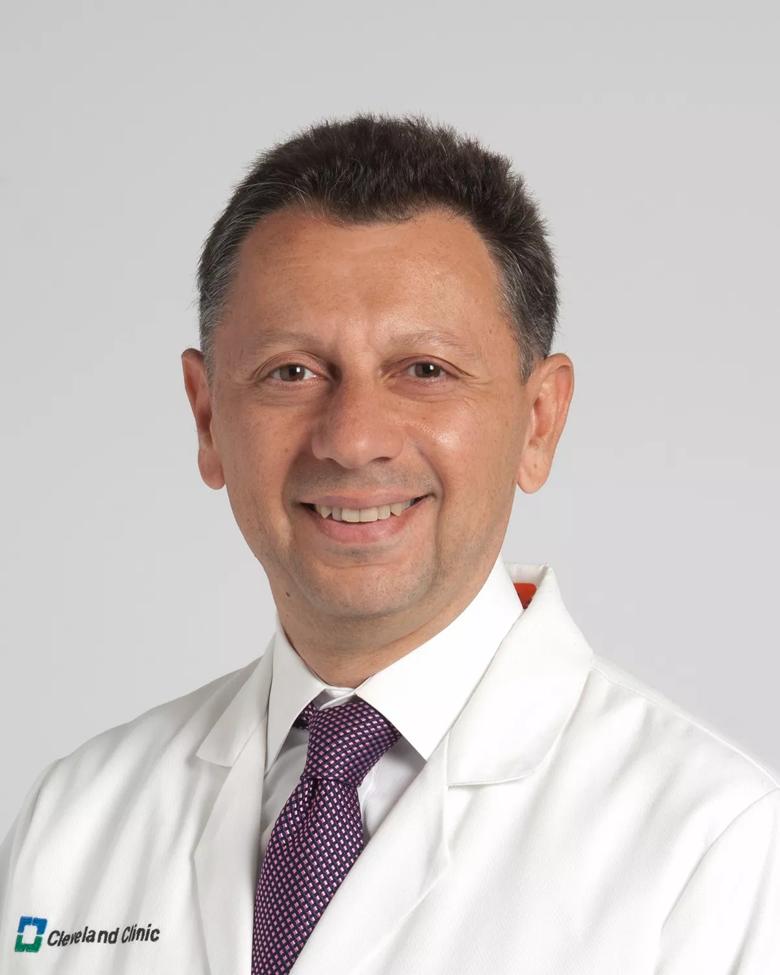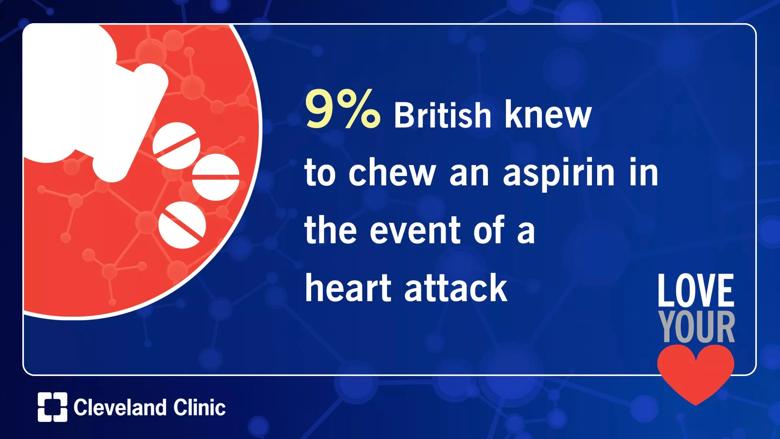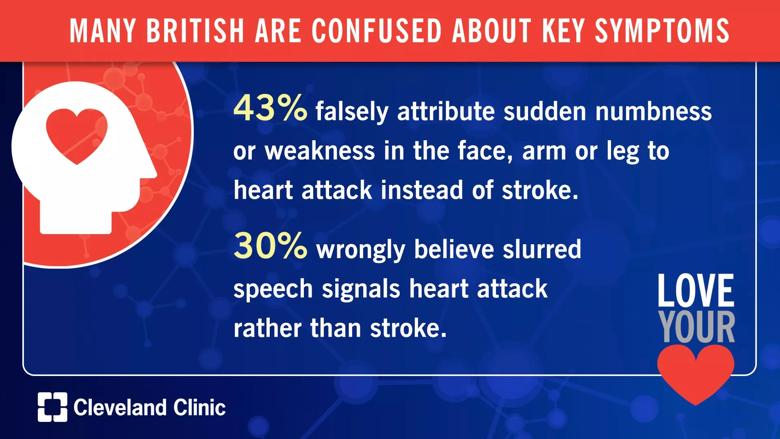Cleveland Clinic News Service | 216.444.0141
We’re available to shoot custom interviews & b-roll for media outlets upon request.
CCNS health and medical content is consumer-friendly, professional broadcast quality (available in HD), and available to media outlets each day.

LONDON: A new UK survey published today by Cleveland Clinic found only 9 percent of people knew chewing aspirin could reduce the severity of a heart attack, highlighting the need for greater public awareness of heart attack symptoms and how to deal with them.

Image content: This image is available to view online.
View image online (https://assets.clevelandclinic.org/transform/f19ba499-14c7-4382-8850-d0c636b717da/Fares_Maan_407562L_jpg)
Maan Fares, M.D., cardiologist and vice chair of Global Patient Services at Cleveland Clinic
The study, commissioned by Cleveland Clinic, a leading non-profit provider of medical care, and conducted by YouGov, asked what you would do if you experienced symptoms of a heart attack. While 81 percent correctly identified “call an ambulance” – widely considered by doctors as the fastest way for a patient to start receiving proper care – just nine percent said they would chew an aspirin as a first response. The common painkiller is known to slow blood clotting and reduce the severity of a heart attack until help arrives. Crucially, chewing rather than swallowing the tablet whole helps the body absorb it faster.
“Heart disease remains one of the top killers in the western part of the world. The sooner you recognize the symptoms of a heart attack, the more likely you are to get help quicker,” said Maan Fares, M.D., a cardiologist and vice chair of Global Patient Services at Cleveland Clinic. “Time is of the essence – people survive if they are treated sooner and the outcome can be better.”

Image content: This image is available to view online.
View image online (https://assets.clevelandclinic.org/transform/c3594c89-f48b-431d-ae5d-708307ee1db7/heart-2018-CCC-184-AsprnBritish-1920x1080_jpg)
The study also found almost half of respondents confused common signs of a stroke with symtoms of a heart attack. Wrongly identified symptoms included sudden numbness or weakness of face, arm or leg (43 percent), slurred speech (30 percent) and trouble seeing in one or both eyes (23 percent). While most respondents recognized these symptoms as a sign of a serious medical incident, it could lead people to administer incorrect first aid.

Image content: This image is available to view online.
View image online (https://assets.clevelandclinic.org/transform/224686fc-3148-43f0-8933-659ff4493fef/heart-2018-CCC-184-britishVers-1920x1080_jpg)
For the real heart attack symptoms, however, recognition was high, with 91percent correctly identifying pressure, squeezing, fullness or pain in the center of your chest, 83 percent identifying shortness of breath, and 86 percent identifying pain in one or both arms.
Cleveland Clinic, a US-based healthcare group with its headquarters in Cleveland, Ohio, announced the building of a new hospital in London in October 2015. A six-story, 198,000-square-foot building at 33 Grosvenor Place will be Cleveland Clinic’s first facility in London, adding another international location to a health system that includes a 165-acre main campus near downtown Cleveland, nine regional hospitals throughout Northeast Ohio, and facilities in Weston, Fla.; Las Vegas, Nev.; Toronto, Canada; and Abu Dhabi, UAE. The hospital is scheduled to open in the second half of 2020.

Image content: This image is available to view online.
View image online (https://assets.clevelandclinic.org/transform/affeb6de-bd17-4e65-8107-cf747362f28e/London-33-Grosvenor-Place-1_jpg)
Maan Fares, M.D., cardiologist and vice chair of Global Patient Services at Cleveland Clinic
Cleveland Clinic London will have 205 inpatient beds, eight operating rooms; a full imaging suite; endoscopy and catheterization labs; day case rooms for surgery; and a full neurological suite with rehabilitation. The facility will offer specialty services focusing on general surgery, cardiology and neurology. The hospital will provide new jobs and employment opportunities for a variety of clinical and non-clinical employees.
An interview with Dr. Maan Fares can be viewed below. Click HERE to download the interview.
Video content: This video is available to watch online.
View video online (https://www.youtube.com/embed/ChFaxg9lNYU?feature=oembed&wmode=transparent)
Editor’s Note: Further information on Cleveland Clinic London is available at http://www.clevelandcliniclondon.uk/
Methodology: This was an online survey conducted among a nationally representative sample across the UK, consisting of 2,297 adults, 48 percent male and 52 percent female, of 18 years of age and older. This survey was conducted by YouGov between Jan. 3 and Jan. 10, 2018.
About Cleveland Clinic
Cleveland Clinic is a nonprofit multispecialty academic medical center that integrates clinical and hospital care with research and education. Located in Cleveland, Ohio, it was founded in 1921 by four renowned physicians with a vision of providing outstanding patient care based upon the principles of cooperation, compassion and innovation. Cleveland Clinic has pioneered many medical breakthroughs, including coronary artery bypass surgery and the first face transplant in the United States. U.S. News & World Report consistently names Cleveland Clinic as one of the nation’s best hospitals in its annual “America’s Best Hospitals” survey. Among Cleveland Clinic’s 51,000 employees are more than 3,500 full-time salaried physicians and researchers and 14,000 nurses, representing 140 medical specialties and subspecialties. Cleveland Clinic’s health system includes a 165-acre main campus near downtown Cleveland, 10 regional hospitals, more than 150 northern Ohio outpatient locations – including 18 full-service family health centers and three health and wellness centers – and locations in Weston, Fla.; Las Vegas, Nev.; Toronto, Canada; Abu Dhabi, UAE; and London, England. In 2016, there were 7.1 million outpatient visits, 161,674 hospital admissions and 207,610 surgical cases throughout Cleveland Clinic’s health system. Patients came for treatment from every state and 185 countries. Visit us at clevelandclinic.org. Follow us at twitter.com/ClevelandClinic. News and resources available at newsroom.clevelandclinic.org.